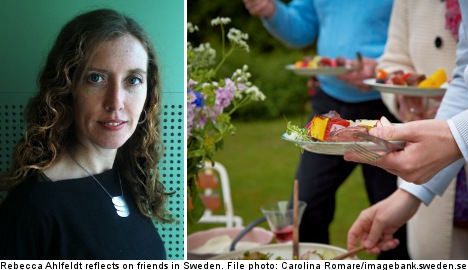In the years before I moved to Sweden, I tried hard to be a good traveller. I wanted to really explore the places I visited, immerse myself in other cultures.
So when I did my study abroad in Spain back in college, I did not seek out other Americans, nor did I really miss the connection with American culture. It was nothing personal; there were, no doubt, plenty of other interesting college students on my programme. But, as I saw it, I hadn’t flown all the way across the Atlantic to meet more Americans.
SEE ALSO: Ten sure-fire ways to bug your Swedish friends
I was there to learn Spanish and immerse myself in everything Spain. I was there for the bullfights and sherry tastings, not complaining about why Spain was so…well, unlike the US. At least, that was my rationale.
Fast-forward a few years…or a little more than a few. I am now, once again, living across the Atlantic, but I am no longer avoiding Americans. In fact, the few Americans I know are my closest friends here.
There’s part of me that’s embarrassed to admit this. I want to integrate, and I believe that friendships are an important part of understanding (and enjoying) a society. But another part of me depends on these friends as a kind of anchor in my new and sometimes confusing cultural explorations.
Part of it has to do with language. I do speak comfortable Swedish with family, colleagues and friends. However, I can’t always convey the subtleties of the language, the right amount of empathy or humour that I can in my native language. There are times when I feel that important parts of my personality are missing from my interactions in Swedish, and sometimes I wonder if I’ll ever feel completely myself speaking Swedish.
And then there are the mistakes.
Like the time, at the dinner table with my in-laws, when I wanted more cucumbers. How many? I answered, “Jag vill ha sex, tack,” which I assumed meant, “I would like six, please.”
Actually, it means, “I want to have sex, please,” my husband later clarified, between snorts of laughter.
My in-laws, my husband later reported, had tried to hide their laughter. Did they feel sorry for me? Did the distance between us widen at that moment? Not that I’m above English flubs and faux pas, but in my native language I’ve certainly never told people I’m hoping to impress that I want to have sex.
SEE ALSO: Ten more Swedish words you won’t find in English
Of course, my Spanish was not flawless either. I started out my stay with a host family on the wrong foot when I was asked how I liked my dormatorio, which I translated as my (college) dormitory and described as cramped, dirty and smelly. It was only after an uncomfortable pause and some badly-phrased questions from my side that I realized that they were, in fact, asking about the room they so kindly were letting me stay in.
But back then, somehow (after they finally understood what I had meant), that kind of thing just didn’t affect me in the same way.
And I don’t think it’s just the language differences that make my North American friends so important.
My sister, now a dual Australian-American citizen happily living in Sydney, also gets together with American friends frequently to talk about cultural differences and aspects of the US they miss, despite the fact that she can express herself with her Australian counterparts much more seamlessly.
I suspect many expats keep this lifeline to their home countries, whether they are Brazilians living in Bali or Spaniards living in Sweden.
But there’s something about relying on friendships from my home country that makes me feel like I’m not being a “good” immigrant. Have I, in my older age, become more closed-minded, less adventurous? Less open to embracing everything Sweden has to offer?
Or have the circumstances changed?
One semester in Spain, with return flight purchased, is much different than an indefinite move to Sweden. I could do just about anything for a semester. But for the rest of my life?
And then there’s the kids. On one hand, kids are a great equalizer, amazingly consistent worldwide for evoking just about every possible emotion from their parents—both good and bad. But for some things, I need cultural support—like doesn’t candy once a week seem like an awful lot? Does Halloween have to be scary and gory, even for my preschooler? And isn’t football practice for eight-year-olds supposed to happen after school, not after dinner?
SEE ALSO: Are Swedes really all blondes and Vikings?
Or maybe I’ve just had more experiences since Spain, and with these experiences comes the ability to better reflect on what will make me happy.
As a student, I was looking for something different in my relationships. I was exotic, a real American like they saw on TV, and my new friends were exotic, real Spaniards that I had learned about in my classes.
But now, if I’m going to make it for the long haul, I don’t really want to feel exotic. I don’t want every aspect of me to be interpreted through the lens of being from the United States. But there are times when that turns out to be an almost insurmountable hurdle.
And I don’t think I’m the only one.
Just this last weekend, when my Canadian friend had fixed dinner—including baking bread—for their (Swedish) guests, she got this response: “What a great housewife you are! No wonder you only have time to work part time.”
Although this comment was most likely meant as a compliment, my friend found it irritating. Would her guest have made the same comment—called her the “h-word”—if my friend were Swedish?
“No way,” my friend answered.
“I just would have been ‘matintresserad.’” Even after seven years of friendship with this family, her one, glaring characteristic is that she’s Canadian—this despite the fact that she’s lived almost half her life outside of Canada.
I do, of course, have Swedish friends, and these are friendships I also value. But my statistics aren’t great: when my husband and I listed eight families we’re inviting for dinner in the next couple months, half of them had a North American in the family.
So I have to ask myself, am I closing myself off from Sweden by creating a mini expat support system, or am I doing what it takes to carve out a comfortable, happy life in my new home?
It’s a question I need to ask because these friendships play a role in nurturing—or hindering—my journey toward feeling Swedish.
Rebecca Ahlfeldt is an American ex-pat writer, translator and editor currently based in Stockholm. Follow Rebecca on Twitter here



 Please whitelist us to continue reading.
Please whitelist us to continue reading.
Member comments